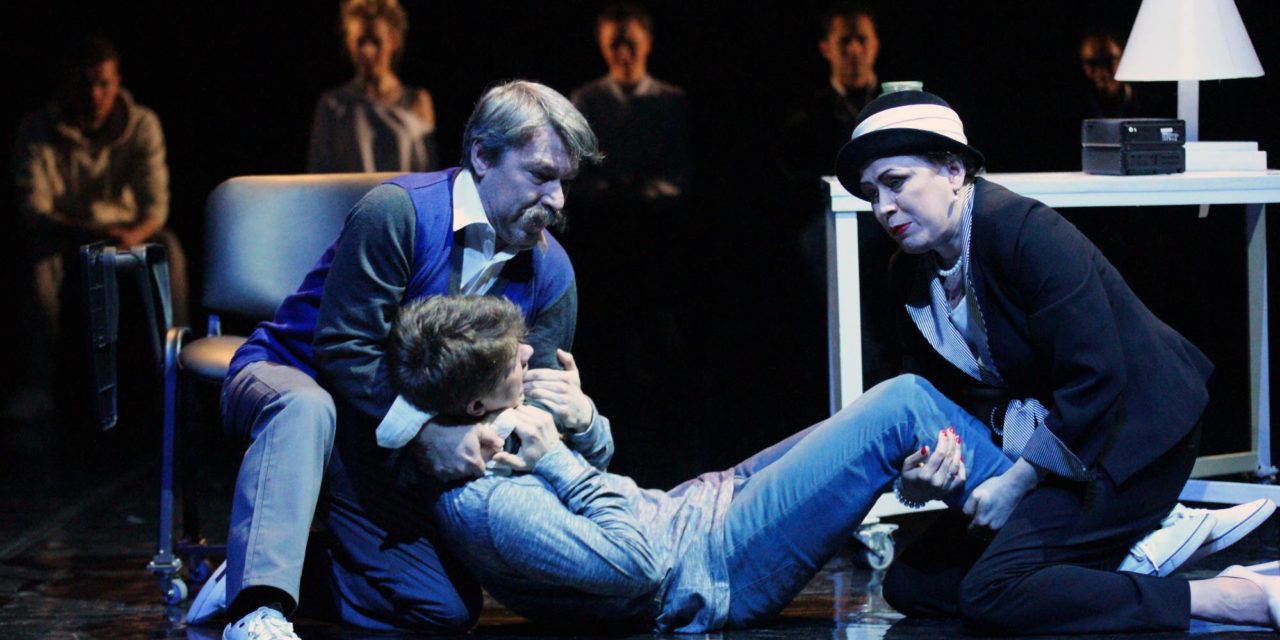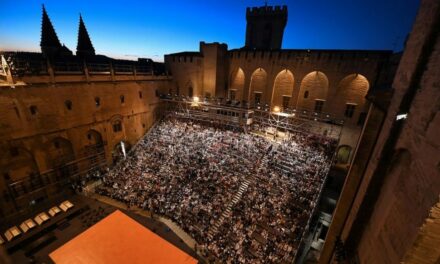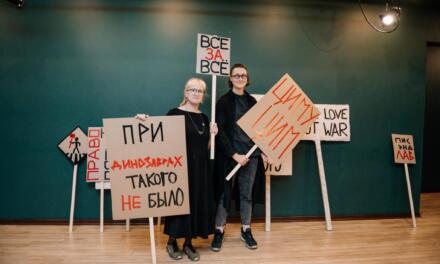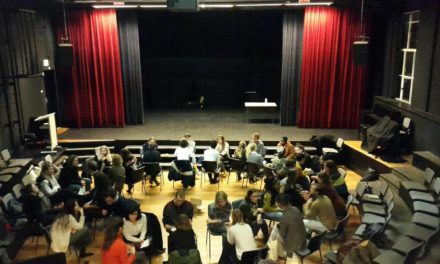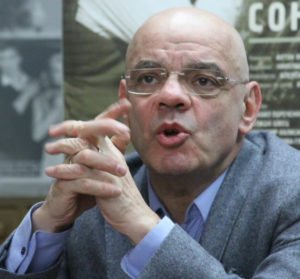
Speaking about recent controversies and rising government pressure on Russian artists, Konstantin Raikin warned “These are completely lawless, extremist, arrogant, aggressive acts hiding behind words about morality, principles, and other generally righteous and lofty terms.” Photo credit V.G. Zimin. Creative Commons
In an emotional speech on October 24, Konstantin Raikin—the artistic director of Moscow’s acclaimed Satirikon Theater—sparked a continuing debate about the re-emergence of state censorship in contemporary Russia. Speaking at the seventh congress of the Union of Theater Workers of the Russian Federation, Raikin insisted that recent state criticism of art and artists resembles practices from the time of Stalin.
Raikin —whose own production about a gay teenager continues to draw outrage from government representatives and protesters —specifically referenced a series of recent controversies and closures. Most recently, a private exhibition of U.S. photographer Jock Sturges was closed in September. After a pro-Kremlin senator stated that Sturges’ photos, some of which depict naked young girls, a protester threw urine on some of the images. Raikin also cited the firing of cultural minister Boris Milgram in August, and recent calls for the government to ban Jesus Christ Superstar, as evidence of rising pressure on artistic leaders to program work in line with Kremlin sensibilities.
In response to these and other pressure, Raikin urged the assembled artistic leaders to speak out together. “ I think that right now we’re living in very difficult, very dangerous, very terrible times,” he said. “It really resembles… I’m not going to say what it resembles. But you all understand. We really need to join together and reject it.” Since Raikin’s speech, various government and cultural figures have spoken out in a still-expanding national debate.
Raikin’s entire speech is translated below. For the full Russian text of the speech, and a video (in Russian), visit Meduza.
THE SPEECH:
I’m going to speak now a little—how should I say—off-the-cuff. Because I’m in rehearsals, I have a show tonight, and I’m a little wobbly on my feet—I’m used to being at the theater early and getting ready for the show. And it’s a little hard for me to speak calmly about the topic I want to discuss. First off, today is October 24—and today would be Arkady Raikin’s 105th birthday, and I congratulate all of you on this occasion, on this date. And, you know what, I want to tell you… When he realized that I was going to become an artist, Papa taught me one more thing; he put this idea in my head, which he called “guild solidarity”. It’s kind of an ethics for dealing with people in the same profession with you. And I think it’s is something which we should all be remembering now.
Because I’m very worried—I think, like all of you are—about a phenomenon which is happening in our lives: these, how should I say, assaults, on art, on theater in particular. These completely lawless, extremist, arrogant, aggressive acts hiding behind words about morality, principles, and other generally righteous and lofty terms: “patriotism,” “Motherland,” and “high morals.” These groups who allegedly abuse people, shut down performances, close exhibitions, behave as if they own the world—and for some reason, the government is neutral towards them, distances itself from what is happening. It seems to me that this is a hideous attack on creative freedom, on the prohibition of censorship. And I don’t know what you might think about the prohibition of censorship, but I believe that it was the greatest secular achievement in our lifetime, and in the artistic and spiritual life of our country. This curse and centuries-old shame of our culture was banned at last.
But now I see that some people are itching to change this and go back. And go back not just to the period of Stagnation, but to go back even earlier—to the times of Stalin. Because our immediate supervisors are speaking in a Stalinist lexicon, in a Stalinist rhetoric, and I can’t believe my ears! Government officials are speaking—my immediate superiors, Mr. [First Deputy Minister of Culture Vladimir] Aristarkhov speaks this way. He speaks in that language and has to be translated into normal Russian; it’s a shame that anyone would speak that way in the name of the Ministry of Culture.
And we sit here and listen to it. Why can’t we—can’t we speak out together?
I know that we all come from different theater traditions. But it also seems to me that we are very divided. We’re not very interested in each other. But that’s only half the trouble. Most importantly, people have this terrible way of sneaking around and ratting each other out. We can’t be doing that right now. It’s unacceptable! Guild solidarity, as my father put it to me, includes every one of us; theater workers—actors, directors, whoever—don’t bad-mouth each other in the mass media. Or to the institutions we depend on. You can disagree creatively with some director or actor—write him a mean email, write him a letter, wait for him at the door and tell him directly. But don’t involve the media, make it public property. Our fights, which will absolutely exist, will be creative disagreements or disturbances—that’s fine. But when we fill these newspapers and magazines and TV, that’s handing it to our enemy. There are those who want to bend art to the interests of the government—small, specific, ideological interests. But, thank God, we have been freed from all that.
I remember: we were all born under the Soviet regime. I remember that shameful idiocy! That’s the only reason I don’t want to be young again—I don’t want to go back there again, to read that filthy book. But I’m forced to read that book again. Because with all this talk about morality, the motherland, and our people, and patriotism, they are usually covering up very low objectives. I don’t believe in these groups of outraged and offended people whose, you know, religious sensibilities are offended. I don’t believe it! I believe that they’ve been paid. There are these small groups of nasty people, who are fighting for “morality” by nasty, illegal means.
When urine is thrown on photographs, is that supposed to be a struggle for morality? You don’t normally need non-governmental organizations fighting for morality in art. The arts have enough filters in their directors, artistic directors, critics, the souls of the artists themselves. All that is what supports morality. Don’t pretend that power is the only legitimate bearer of righteousness and morality. It’s not true.
In general, any power gets a lot of temptation; there are so many temptations that any smart power supports the arts so that the arts can hold up a mirror to power and show it, in that mirror, the mistakes, the sins, and the errors of the power. But instead of our government paying for that, our leaders are saying to us: “Do this. We’re giving you the money, so you have to do it.” But who knows what we need to do? Them? Who’s supposed to tell us? All the time, I hear “That’s foreign to our values. It’s harmful to our people.” Who decides that? Are they going to decide that? They’re not supposed to interfere. They’re supposed to be helping the arts, helping the culture.
I think that we need to unite. I’ll say it again: we need to unite. We need to forget, for the time being, our delicate artistic reflections on one another. I may not like the work of some director much, but I’ll defend to my last breath his right to make it. Yes, I’m using Voltaire’s words here. Basically. Because I’m such a quality humanist, right? But all jokes aside, I think everyone gets it. It’s fine: people will disagree, people will get upset.
Occasionally, our people from the theater meet with the president. These meetings are very rare. And, I would say, decorative. But occasionally they do happen. And it’s possible to solve some serious problems there. But no. When we go there, for some reason, we get suggestions to establish a possible limit on acceptable interpretations of the classics. But why should a president be establishing these boundaries? Why should this be his concern? There’s no real reason for him to understand all that. He doesn’t understand, and he doesn’t need to understand. And anyway, why should he set that border? Who will guard it? We don’t need that… Let them be interpreted. Someone will get upset—that’s great.
In general, we have a lot of interesting things happening in the theater. And a lot of interesting shows. I think that’s great. They’re different, they’re controversial, they’re great! But for some reason, again, we’re… We’re slandering each other, writing reports on each other, snitching on each other, just like that. And we want to go back into the cage. Why go back into a cage? We’re hearing “Bring on that censorship!” and we don’t need it—we don’t! God, why do we get rid of something and then immediately give up what we’ve gained? Why are we illustrating Fyodor Mikhailovich Dostoyevsky’s quote, “Take us out of custody, and we immediately want to go back”? Why? Is he really such a genius, that he ratted us out for a thousand years to come? Figured out our innate servility, or something like that?
I suggest: guys, we must speak out against it all! These closings are happening, and we stay silent. Why are we silent all the time? They’re closing shows, they’re closing…They banned Jesus Christ Superstar, for God’s sake! “No, it will offend someone.” Yes, it will offend someone, so what?
And the Church, our poor Church, has forgotten how they hounded it, how they destroyed the priests, how they took away the crosses, how they turned our churches into warehouses. That starts with the same behaviors we’re seeing now. So Lev Nikolaevich Tolstoy was right when he said that the church and the state shouldn’t be connected, because the church will stop serving God and start serving the state. Which we’re actually watching right now.
We don’t need to worry that the Church is going to get upset! So what! Don’t go ahead and close everything! Or if they do close something, we need to react to that. All together. They tried to do something to Boris Milgram in Perm. But somehow a bunch of us stood up to the power. And he was returned to his position. Can you imagine? Our powerful government retreated a step. They tried to do something stupid, and they retreated a step and fixed it. That’s amazing. That’s so rare, so atypical. We accomplished something. We got together and suddenly spoke out.
I think that right now we’re living in very difficult, very dangerous, very terrible times. It really resembles… I’m not going to say what it resembles. But you all understand. We really need to join together and reject it.
This post was written by the author in their personal capacity.The opinions expressed in this article are the author’s own and do not reflect the view of The Theatre Times, their staff or collaborators.
This post was written by Robert Duffley.
The views expressed here belong to the author and do not necessarily reflect our views and opinions.

